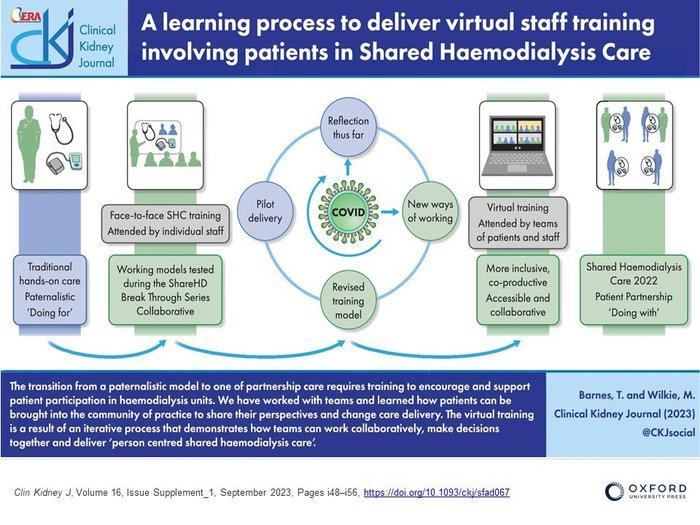What I tell my patients about shared haemodialysis care
“It is normal practice for staff to undertake procedures for patients when they attend a hospital or clinic. However, in outpatient haemodialysis units it is becoming increasingly more common to offer patients the opportunity to participate in aspects of their dialysis. This is called shared haemodialysis care, and it can help to keep you involved in your treatment and more independent.
“Shared haemodialysis care allows you to choose which aspects of your care that you undertake, from small tasks such as taking your own blood pressure and weight, to any (or all) of the other dialysis tasks. The emphasis is on taking part and engaging at a level that suits you as an individual.
“We know that people who take a greater role in their care do better in many ways. For example, requiring fewer visits to their GP, being less likely to be admitted to hospital and experiencing better mental and physical health. This could be because they’re involved in decisions about their own healthcare and people who understand their condition are better able to monitor their diet, fluids, and medication. They also know how to reduce the risk of complications and importantly, when to seek help.
“Shared haemodialysis care was introduced to create a culture of participation and partnership, in order to improve patients’ experiences of dialysis. As a consequence of this work, NHS England’s National Service Specification for Haemodialysis now states that shared care should be offered to all centre-based dialysis patients.”
I feel I have control over my condition, not the other way around. It adds value and self worth to my treatment. My machine became my friend.Andy Henwood
What difference will it make to me?
“Being told that you have kidney disease, a serious long-term condition that requires dialysis, can feel overwhelming. It is easy to feel that you have lost control over your life, particularly as the treatment requires so many changes to day-to-day living.
“There is good evidence that people can develop positive outlook, feel better and feel more in control, if they understand more about and involve themselves in their own treatment. Patients who have been involved in shared haemodialysis care tell us that they:
- feel more confident and in control
- feel less dependent on others
- feel they better understand their condition and become experts in their own care
- feel that, if needling their own fistula, they experience less discomfort
- feel more positive and have a greater sense of purpose
- feel that they are kept occupied and waiting is less of a problem
“Some patients who participate in shared haemodialysis care gain the confidence and skills to consider going home to dialyse, although this is entirely optional. Others choose to stay within the unit, either sharing their care with staff or undertaking all their tasks themselves (self-care).”
Shared Care: more information for health professionals
- Learn how to initiate or rejuvenate shared haemodialysis care and provide lasting benefits for both patients and staff on the Shared Haemodialysis Care Training Course. Visit the Sharing Haemodialysis Care website for more details.
- Read or download the Kidney Care UK patient information leaflet about shared haemodialysis care.
- Read the Clinical Kidney Journal article A learning process to deliver virtual staff training involving patients in shared haemodialysis care by Tania Barnes and Martin Wilkie.
